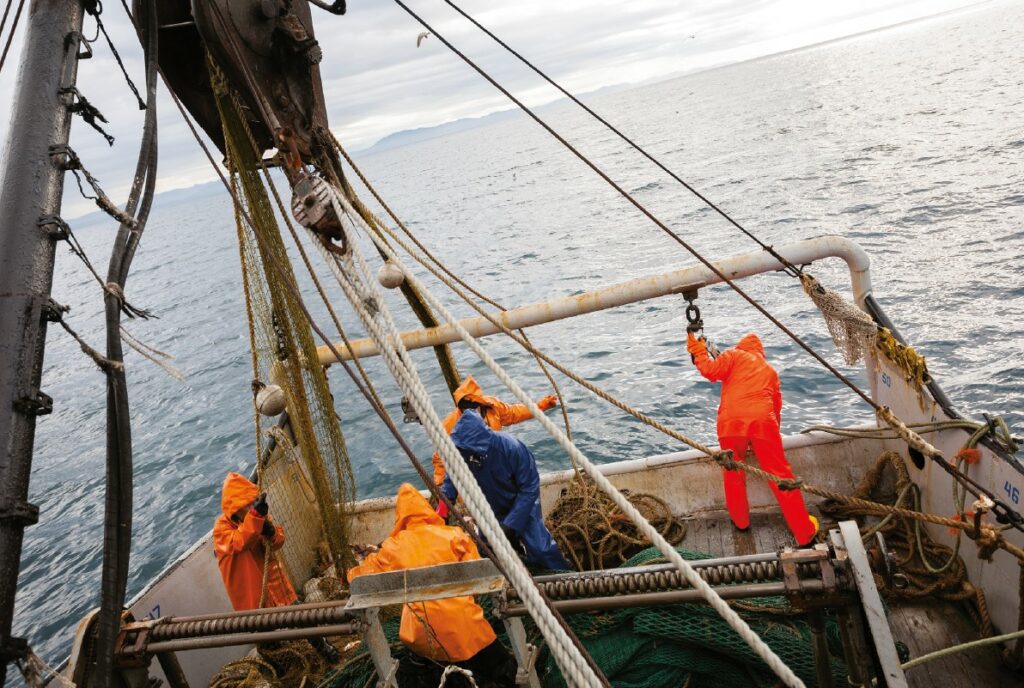Jess Sparks 博士

In June 2022, the International Labour Organization (ILO) of the United Nations adopted “safe and healthy working environments” as their fifth category of Fundamental Principles and Rights at Work, demonstrating the intrinsic links between safety and decent work and unsafe and indecent work1. As fishing is notoriously one of the world’s most dangerous professions2, recognition of these links is also embedded in the ILO’s (2007) Work in Fishing Convention (c188) – which establishes minimum standards for decent work on board fishing vessels3. Decent work is just one end of the spectrum of working conditions on board fishing vessels, with egregious violations of human rights constituting forced labour, human trafficking, and modern slavery at the other end. In between decent work and forced labour are a range of conditions that may be exploitative and discriminatory but not in violation of labour laws (e.g., unequal pay for migrant fishers for equal, shared work with national fishers) or conditions that violate labour rights and protections, but may not amount to forced labour) 4.
Bidirectional linkages between (un)safe working conditions and (in)decent work across fleets globally have also emerged in research. First, exploitative labour practices make the work on board vessels even more unsafe. For example, many exploited fishers working in fleets from Thailand5 to the UK4 to China6 report excessive working hours in contravention of ILO C188; denial and sometimes falsification of rest hours; and tied immigration schemes that blur the lines of what constitutes work – compelling some fishers to perform unvalued work (e.g., mending nets and vessel repairs) onboard the vessel while in port on their ‘rest’ days, or this may involve the denial or withholding of food and water until a certain amount of fish has been caught; as punishment for a poor catch.
Both scenarios compound the dangers already involved when working on a vessel as fatigued and malnourished fishers are more prone to making mistakes with serious consequences to their health and safety, and potentially the health and safety of others on board the vessel through no fault of their own. In research from the UK, migrant fishers in the sample were significantly more likely to incur injuries than national fishers4. Further, since many exploited fishers globally are transnational migrants, their precarious
此外,由于全球许多被剥削的渔民都是 跨国移民,他们不稳定的移民身份可能会使他们 无法获得医疗服务,包括常规医疗服务,这些服 务可以及早发现与极度疲劳、慢性疲劳和营养不 良相关的疾病。
Safety matters may also influence working conditions. There is some speculation, though it has yet to be empirically tested, that safety violations may be an early indicator of future exploitative labour practices, as these violations may be an early warning sign of a tipping point into decreasing profitability and the associated ‘corner cutting’ that often underpins the exploitation of crew 7. And increasingly, the fishing industry needs to anticipate and plan for future scenarios where climate change will also likely exacerbate these links between safety and decent work, such as extreme storms, extreme heat, and wave and wind changes that may lead to occupationally hazardous work, longer trips at sea, longer working hours, and the need for more safety equipment. Suppose these impacts are not mitigated, and the industry is perceived as becoming more dangerous due to climatic changes. In that case, it could intensify crew labour shortages that are known to increase reliance on migrant fishers and drive exploitative practices.
该渔业行业还必须努力理解和界定这些相互联系。 一方面,将工作条件置于更重要的安全参考范围 内,有可能获得利益相关方的更多认同。因为与对 待移民船员相比,这一话题的分歧往往更小。另一 方面,这种情境化分析也可能会增加忽视导致渔船 船员受剥削的系统性驱动因素的风险,这些做法没 有达到强迫劳动作为体面工作的门槛。
疲劳和营养不良的渔民更容易犯错误,对他们的健康和安全造成严重后果
Jess Sparks博士是塔夫茨大学(Tufts University)弗里德曼营养科学与政策学院的研究 助理教授,也是诺丁汉大学权利实验室的研究员, 她拥有近十年的研究全球渔业工作条件的经验。
参考文献
International Labour Organization. (2022, June). International Labour Conference adds safety and health to Fundamental Principles and Rights at Work. https://www.ilo.org/global/about-the-ilo/newsroom/news/WCMS_848132/lang–en/index.htm
Young, E. (2022, September). To improve fisheries health and safety at sea, U.N. delegates must act now. https://www.pewtrusts.org/en/research-and-analysis/articles/2022/09/02/to-improve-fisheries-health-andsafety-at-sea-un-delegates-must-act-now
International Labour Organization. C188- Work in Fishing Convention, 2007. https://www.ilo.org/dyn/normlex/en/f?p=NORMLEXPUB:12100:0::NO::P12100_ILO_CODE:C188
Decker Sparks, J. L. (2022). Letting exploitation off the hook? Evidencing labour abuses in UK fishing . https://www.nottingham.ac.uk/research/beacons-of-excellence/rightslab/resources/reports-and-briefings/2022/may/lettingexploitation-off-the-hook.pdf
Issara & International Justice Mission. (2017). Not in the same boat: Prevalence and patterns of labour abuse across Thailand’s diverse fishing industry. https://ijmstoragelive.blob.core.windows.net/ijmna/documents/studies/IJMNot-In-The-Same-Boat.pdf
Mongabay, Tansa, & The Environmental Reporting Collective. (2021, September). Worked to death: How a Chinese tuna juggernaut crushed its Indonesian workers. https://news.mongabay.com/2021/09/worked-to-deathhow-a-chinese-tuna-juggernaut-crushed-its-indonesianworkers/
Decker Sparks, J. L. & Hasche, L. K. (2019). Complex linkages between forced labor slavery and environmental decline in marine fisheries. Journal of Human Rights, 18(2), 230-245.
